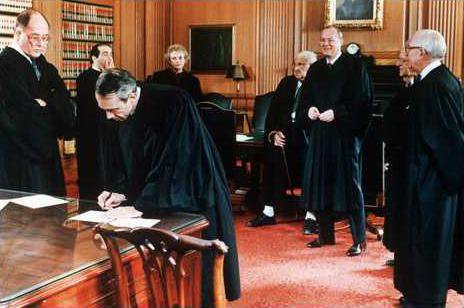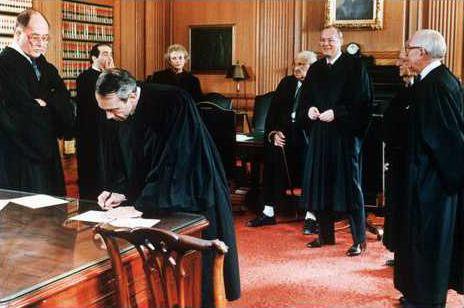Former Supreme Court Chief Justice William H. Rehnquist was famously conservative and a champion of states' rights, but in a 2003 Supreme Court opinion, he ruled in favor of suing state employers for "violating a federal law that allowed time off for emergencies."
Writing the majority opinion, Rehnquist criticized "the pervasive sex-role stereotype that caring for family members is women's work," wrote Adam Liptak for The New York Times.
Liptak noted that during the term Rehnquist "suddenly turned into a feminist," one of his daughters had recently been divorced and become a single, working mother.
New research suggests that may not be a rarity among judges. A new study conducted by Maya Sen of University of Rochester and Adam Glynn of Harvard University shows that judges with daughters "are more likely to vote in favor of women's rights than ones with only sons," wrote Liptak.
The study reveals that judges with at least one daughter are 7 percent more likely to "vote in a feminist direction" in gender-related cases. That includes issues such as Title IX, gender discrimination, employment opportunity, pregnancy discrimination and abortion.
NPR reporter Shankar Vedentam noted, "(I)nterestingly (researchers) find that this effect is strongest among Republican men. So, male Republican judges with daughters are most likely to vote differently than male Republican judges who don't have daughters. And also this difference emerges only for cases involving gender. It doesn't emerge for cases involving bankruptcy or other kinds of the law."
The researchers analyzed 2,674 unique votes by 224 federal appeals court judges in gender-related cases, according to the study.
The Times' Liptak wrote, "Additional daughters do not seem to matter. But the effect of having a daughter is even larger when you limit the comparison to judges with only one child. … There was no relationship between having daughters and liberal votes generally. Daughters made a difference in only 'civil cases having a gendered dimension.'"
Why do daughters make this significant difference? The researchers rule out the possibility that judges are trying to protect their own daughters or that the effect is "driven by most forms of lobbying or social pressure." When judges have a daughter, the study hypothesizes, judges are led to "learn about issues that they ordinarily would not be exposed to — e.g., discrimination on the basis of pregnancy, Title IX, reproductive rights issues, etc.," the study says.
"An interaction between daughters and a judge being female is not significant, it is clear that the effect is driven primarily by the men in the sample ... For example, women judges will already have first-hand experience with the difficulties of being female and in the workplace," the study says. "Male judges, however, do not have this first-hand experience; for them, the experience for having daughters introduces them to the challenges faced by young women."
"You could make the argument that judges with daughters are being biased, but you could just as easily make the argument that compared to judges who have daughters, judges who have sons are biased in a different direction," NPR's Vedentam said. "And I think what the study is pointing to is the fallacy of imagining that judges rule on the bench without bringing their personal experiences to bear. The better question to ask might be, 'what biases do you want the judges to have,' not whether the judges are biased at all."
amcdonald@deseretnews
@amymcdonald89
Judges with daughters more likely to rule in favor of women's rights





